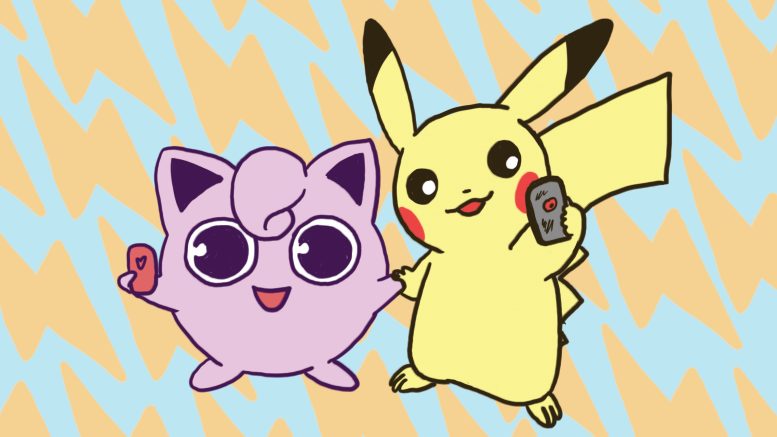Even if you’re not playing Pokémon GO yet, chances are you’ve heard of it.
The new mobile game for iOS and Android launched on July 6 in the U.S. and July 17 in Canada. Developed by Niantic and the Pokémon Company, the game layers augmented reality (AR) technology on the real world. As you walk around your neighbourhood or school, you are able to capture, train, battle, and interact with Pokémon; the brightly coloured creatures from Nintendo’s 20-year running franchise. Already Pokémon GO has over 15 million downloads.
Pokémon GO is far from Niantic’s first run at AR games (they released their first, Field Trip, in 2012) and it builds on concepts developed as early as the turn of the millennium with geocaching, a worldwide GPS treasure hunting game. However, GO may well be the first such game in a franchise as recognizable, or meaningful, as Pokémon,.
I started playing Pokémon at three years old with the original games – Pokémon Red and Blue. Some of my earliest memories are of huddling over a GameBoy Color screen with my parents, fighting our way through caves and discovering new secrets. As a nerdy, introverted kid, the ability to interact passionately and creatively with a game that was so expansive and so far-reaching was incredible.
As the years went on, the franchise continued with new games to play with and new batches of Pokémon released every few years (now up to six generations, and soon to be seven). While only a small number of fans stayed with the franchise, many people around my age stopped playing some time during those years – after all, middle- and high-school are very reconstructive times for a young person’s identity. However, there remained a collective nostalgia for the franchise.
Enter Pokémon GO. What is truly surprising, and very heartening, is not that Pokémon-lovers have embraced the game, but that such a wide-reaching audience has found something in it to enjoy. Many of the Pokémon GO players that I have seen, whether they are walking around their neighbourhoods or posting pictures of their favourites online, are people in their twenties or early thirties: people who loved the games as children but have not returned to them since. For these people, the game can, with its nonlinear objectives and global span, be a way to personalize a journey of discovery while sharing the experience with fellow players.
As with nearly any popular trend, there has been a range of comments and criticisms about Pokémon GO.
Some have pointed to the game’s potential dangers. Large numbers of young people walking around staring at their phones do tend to cause some distress, but these are problems that have existed for years with phones and portable music players. They require caution, but not alarm. While some worry about the dangers to children who might roam around at night in search of Pokémon, one wonders if proper parental supervision, as well as an influx of older, friendly faces with a shared goal, might not even help brighten up the community a bit, as evidence would seem to suggest.
The largest opposition that I have seen to GO’s stellar success, however, has been somewhat different, carrying a tone not of concern, but of acrimony, elitism, and mean-spirited pessimism. Articles, think-pieces, and tweet after tweet have decried the game’s popularity and insulted its players.
To this I have only one response: not only is Pokémon GO fun, it is also important. It is important in an age where nostalgia is often a corporate product, for us to reconnect with our childhoods on our own terms, in a way that makes us happy and inspires our creativity. This is something that GO, a game about personalizing your experience and taking your own journey, allows us to do. It is important for us to relate to the next generation on shared terms that let us enjoy each other’s company – the image of parents and older siblings connecting and sharing their youths by playing Pokémon GO with young children comes to mind. Even to those who may never have heard of the series, GO is too positive to be stamped down by the negativity. As well, it is important for us to do all of these things in a way that promotes activity, exercise, healthy living, and adventure.
An article has been passed around on Facebook recently, written by the mother of a son with autism, describing how the game has improved his life and his interactions with the people around him. To me, this is perfectly indicative of the power of entertainment that can unite us around a shared love. And when that shared love is something already ingrained in the history of so many people, it becomes very powerful indeed.
So if you have been resisting the pull to get into GO, give it a try and set out on your own journey – your inner child might just thank you.



